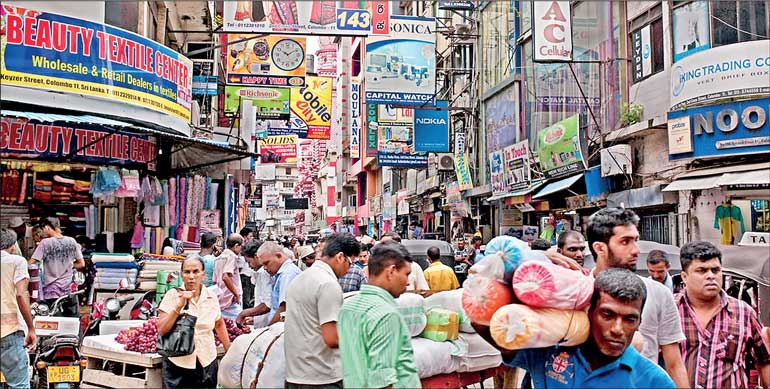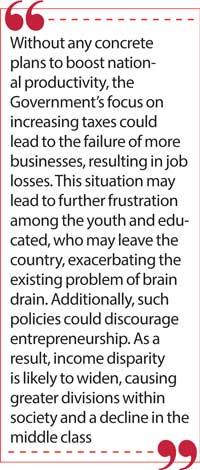Sunday Feb 22, 2026
Sunday Feb 22, 2026
Tuesday, 18 April 2023 00:25 - - {{hitsCtrl.values.hits}}

The average Sri Lankan may not fully understand the huge impact that such a reduction will have on our banking and financial systems, particularly since the truth has not been fully disclosed to the public
 You find yourself in a challenging situation, lost in the jungle with your group, and the guides have lost their way. It’s dark, and no one has a torch. With one wrong turn, you all fall into a deep pit. Now you have a bigger problem: before you can continue your journey, you need to get out of the pit. As you search for a way out, someone offers to lend you a ladder, and you accept their help. Blindly trusting the first person who offers assistance might not be the wisest thing to do, but you are so desperate to get out of the mess that you accept the ladder. But hang on, it’s not just a helping hand. There seem to be a lot of conditions attached. The main condition is that once you get out of the pit, you have to follow the only path the helper would advise.
You find yourself in a challenging situation, lost in the jungle with your group, and the guides have lost their way. It’s dark, and no one has a torch. With one wrong turn, you all fall into a deep pit. Now you have a bigger problem: before you can continue your journey, you need to get out of the pit. As you search for a way out, someone offers to lend you a ladder, and you accept their help. Blindly trusting the first person who offers assistance might not be the wisest thing to do, but you are so desperate to get out of the mess that you accept the ladder. But hang on, it’s not just a helping hand. There seem to be a lot of conditions attached. The main condition is that once you get out of the pit, you have to follow the only path the helper would advise.
The guides have a responsibility for the whole group. They have already made mistakes getting you into trouble. Isn’t it more responsible to consider the circumstances of individual members in the team? They may have differences. Perhaps some cannot walk fast or climb hills. Not everybody can swim if the new path you are advised to follow has deep water bodies along the way. There are many reasons why you should exercise caution and make an informed decision about your next steps once you climb out of the pit. It’s better to take some time to survey your surroundings and gather as much information as possible without blindly following someone’s advice. You may also want to consider whether their proposed route aligns with your group’s goals and preferences.
Isn’t this precisely the situation we are in with the proposed IMF program?
How we got into this mess
“Now, let’s go back to history and reflect on how we got into this mess. Let’s start with the end of 2019, when Gotabaya Rajapaksa became the president.
The country had accumulated a huge debt stock, and the foreign debt component accounted for 49% of it. According to the Annual Report 2019 published by the Ministry of Finance, the foreign debt service requirement for the next three years was $ 12.7 billion.
We have been running a balance of payment deficit of over $ 2 billion every year since 2010. This gap has always been bridged with new borrowings. For example, between the period of 2015-2019, the Government had issued $ 12.05 billion worth of ISBs.
We only had $ 7.6 billion in reserves, which also included currency swap facilities. In other words, Sri Lanka’s foreign reserves were not enough to meet the debt obligations of the coming years without further borrowings.”
President Gotabaya Rajapaksa and his two successive finance ministers, Mahinda Rajapaksa and Basil Rajapaksa, failed to grasp this simple formula during the 2020-2022 period. Whether officials can be blamed for not providing accurate advice is a separate issue, and each may have their own explanation. For instance, during an investigation by the committee on public finance, former Central Bank Governor Prof. W.D. Lakshman asserted that he had repeatedly warned the President’s office, about an impending balance of payment crisis. However, it is uncertain whether those letters were received by the President or were held up at a higher level within the Presidential secretariat. Regardless, the bottom line remains that leaders are ultimately responsible for the decisions, whether they are made or not.
 Had those responsible for the economy exercised even a modicum of foresight, they would have anticipated the toll that COVID-19 would take on tourism and exports in 2020 and 2021, culminating in a grave balance of payment crisis. However, it seems that President Gotabaya Rajapaksa had already made up his mind to eschew borrowing from foreign sources, as previous administrations had done in the past decade, considering it a negative practice. He had expressed this opinion on several occasions, both in public and private settings. It seems that neither his main economic advisor, Dr. P.B. Jayasundara, nor any other influential figure, had enlightened him on the significance of borrowing foreign currency, not just for vital exports but also for debt repayments.
Had those responsible for the economy exercised even a modicum of foresight, they would have anticipated the toll that COVID-19 would take on tourism and exports in 2020 and 2021, culminating in a grave balance of payment crisis. However, it seems that President Gotabaya Rajapaksa had already made up his mind to eschew borrowing from foreign sources, as previous administrations had done in the past decade, considering it a negative practice. He had expressed this opinion on several occasions, both in public and private settings. It seems that neither his main economic advisor, Dr. P.B. Jayasundara, nor any other influential figure, had enlightened him on the significance of borrowing foreign currency, not just for vital exports but also for debt repayments.
Between 2020 and 2021, the cumulative drop in tourism income alone exceeded $ 6 billion due to the COVID-19 pandemic. However, no issuance of ISBs or any other foreign borrowings took place during that time. Furthermore, the Government cancelled several long-term projects that were to be aided by foreign countries, including the Japanese mono rail project, resulting in the loss of potential foreign currency inflows. As a consequence, it is not surprising that by early 2022, Sri Lanka was facing a severe balance of payment crisis, making it impossible to meet debt obligations and continue importing essential goods such as oil and gas.
Everyone remembers the gas and fuel shortages, electricity cuts, and import difficulties that followed. This occurred during a period when President Gotabaya Rajapaksa was conducting various experiments, including changing cabinet ministers, appointing new economic advisors, and replacing high-ranking officials. Heads rolled, and fresh faces took on new responsibilities. A new Finance Minister, Central Bank Governor, and Treasury Secretary were appointed, and they did something unexpected: they announced a “soft default,” a term unfamiliar to most of us. To the rest of the world and our creditors, Sri Lanka had simply gone bankrupt. As a result, all potential loans, swaps, and credit lines came to an immediate halt.
It was in this context that Sri Lanka had to seek support from the International Monetary Fund (IMF). Despite popular belief, it was not under the current president but the former president that Sri Lanka sought IMF assistance. The newly appointed Finance Minister, Ali Sabry, attended the first round of discussions with the IMF. The financial and legal advisors Lazard and Clifford Chance were also appointed by President Gotabaya. However, his tenure was cut short when he was ousted, despite having won the people’s mandate. Subsequently, the new president, Ranil Wickremesinghe, a National List MP, was elected by Parliament.
Two significant achievements of the new administration
There are two significant achievements of the new administration, according to public perception, and it’s worthwhile reflecting on them to understand the bigger picture. Firstly, the long queues that frustrated the people have disappeared, and life seems to be back to normal. However, since April 2022, Sri Lanka was not meeting its debt obligations, fuel was rationed and we are today paying much higher rates for electricity, fuel, and gas. The rain gods have been kind during the last 12 months, aiding electricity supply, and the world oil prices have come down by almost half since June last year, resulting in significant foreign currency savings for the country. Severe exports restrictions though helped the reducing trade deficit no one spoke about the closure of businesses, loss of jobs and also the indirect impact on exports. The overall contraction of the economy in 2022 was about 8.7%.
Secondly, Sri Lanka has been able to conclude the IMF negotiation within about a year since it started. Typically, tough and time-consuming negotiations take place when two sides with different viewpoints try to come to an agreement. However, when one side is relatively ill-prepared and directed from the top to accept any condition to come to an agreement, negotiations become much easier. This is the current situation with the IMF, which has promised $ 2.9 billion of loans over a period of four years, with Sri Lanka agreeing to several seemingly unrealistic conditions.
The current debt portfolio of Sri Lanka has two main components, as recently stated in a joint presentation by the Governor of the Central Bank and the Secretary to the Treasury. These components are the Central Government and Guaranteed SOEs Foreign Currency Debt, which amounts to $ 45.5 billion, and the Central Government Local
Currency Debt, which is Rs. 13,189 billion or equivalent to $ 36.3 billion
Over the next five years, the Government hopes to bridge the financing gap through a reduction of $ 16.8 billion in external debt service, as well as $ 6.75 billion in new multilateral funding. In an open letter to all creditors, President Ranil Wickremesinghe assured that all creditors would be treated equally.
However, the unspoken truth is that while Sri Lanka is expecting foreign creditors to have a haircut of $ 14.7 billion, which is 32% of their total holdings, the remainder of the reduction is expected to come from local creditors. This includes treasury bills, treasury bonds, CBSL advances, and other loans.
The average Sri Lankan may not fully understand the huge impact that such a reduction will have on our banking and financial systems, particularly since the truth has not been fully disclosed to the public.
Without any concrete plans to boost national productivity, the Government’s focus on increasing taxes could lead to the failure of more businesses, resulting in job losses. This situation may lead to further frustration among the youth and educated, who may leave the country, exacerbating the existing problem of brain drain. Additionally, such policies could discourage entrepreneurship. As a result, income disparity is likely to widen, causing greater divisions within society and a decline in the middle class.
According to IMF projections, even in 2027, Sri Lanka is expected to have a marginal 3% growth. Looking at the numbers, it is very clear that the Sri Lankan Government has not presented a sustainable growth plan, except for relying on highly unrealistic debt reduction proposals and additional borrowings that will have to be paid by future generations.
Is this the major victory that government supporters are celebrating?
While the Sri Lankan Government is currently focused on resolving its debt crisis, it’s important to recognise that the world order is constantly evolving, and the global financial system is rapidly changing. The BRICS countries, namely Brazil, Russia, India, China, and South Africa, are attempting to change the world reserve currency, with Saudi Arabia being the latest entrant to support this change. This is a significant shift from its previous role in helping the United States in the early 1970s to establish the petrodollar and maintain global financial dominance up until now. As a result, the rules of the game have begun to change, with China and India poised to play a significant role in future global economics.
Adapting to the changing global landscape
How much will Sri Lanka’s heavy reliance on IMF support limit its options in the changing global landscape?
Countries that can recognise the rapid changes and adapt to them quickly will have the opportunity to seize new opportunities and achieve economic growth. In the long run, the US dollar might not remain as the global reserve currency, which makes building up reserves in multiple currencies a requirement for being active in global trade in the future. Therefore, while it’s crucial for Sri Lanka to address its debt crisis, it’s equally important for those handling the affairs to keep an eye on the bigger picture and be proactive in adapting to the changing global landscape. Only by doing so, Sri Lanka will be able to position itself to take advantage of new opportunities and achieve sustainable economic growth in the long run.
(The writer is a Member of Parliament.)